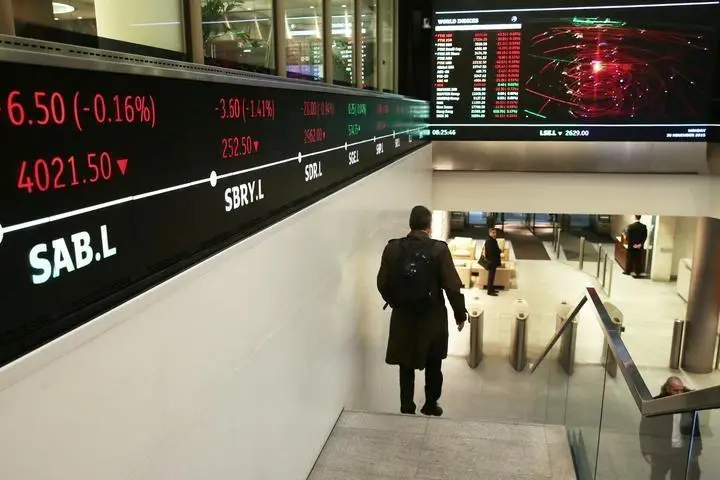PHOTO
LONDON - As Brexit talks drag on, sterling trading volumes in London, the world's biggest forex trading centre, are languishing well below long-term averages, with long-term investors and sovereign players set to stay on the sidelines until the crisis is over.
Trading volumes in the pound have inched higher since the start of 2019 as Britain's scheduled March 29 exit from the European Union approaches. But in the past year -- a period when virtually every one of the world's major currencies including the Chinese yuan clocked increased market share -- interest in trading sterling tailed off.
That drop in volumes, a clear sign of investors' reluctance to buy and sell British assets, may be contributing to sterling volatility, with many citing reduced liquidity as a reason why the currency seems to have become vulnerable to exaggerated swings on relatively minor headlines in recent weeks.
"A lot of people... have increased exposure (in recent weeks) though sterling volumes are about 40-50 percent lower than pre-Brexit roughly on an average," said Fabrizio Russo, Nomura's head of foreign exchange sales for Europe, the Middle East and Africa. He was speaking of turnover on Nomura's platform.
Dollar/pound remains the second-most traded exchange rate in London but average daily turnover dropped to $324 billion in the six-month period ending October 2018, versus $351 billion in the previous period ending April 2018, according to the latest data from the Bank of England.
The size of the broader currency market has expanded in the past four years but the pound's percentage market share has broadly stagnated and against some currencies it has fallen.
The share of the pound/dollar exchange rate declined to 12.4 percent in October 2018 from 12.9 percent earlier while the euro/pound exchange rate EURGBP= , the most susceptible to Brexit-related headlines, has seen its share decline to 2.5 percent, according to BOE data which is based on FX trading in London.
Before the June 2016 Brexit referendum, euro/pound's share was 2.6 percent, peaking at 2.9 percent in October 2016.
Such has been its decline that even the offshore-traded Chinese currency has overtaken the euro/pound rate, with a 2.8 percent share in London versus the dollar, almost double 2016 levels. The Australian dollar and Japanese yen also increased their shares, to 5.1 percent and 12.2 percent respectively, the BOE said.
Instead, more investors have turned to the derivative markets to hedge sterling bets, preferring to take positions here rather than the volatile spot market.
Because the pound has become more susceptible to Brexit headlines, companies and some institutional investors have taken to the currency forwards and swaps markets to execute their currency needs rather than executing them via cash markets, a head of trading at a European bank in London said.
For instance, CLS data shows average daily turnover on sterling swaps rose to $202 billion in January 2019 from $188 billion a year ago. Similar increases were noticed even in the euro/pound currency swap markets with a 27 percent increase in swaps to $24 billion.
Average daily turnover on pound/euro currency futures on a platform run by the CME group has jumped to more than nearly 5,000 contracts this week, from 1,500 contracts at the start of February.
RISING BACK
Of late, expectations of a Brexit solution have fuelled some interest in sterling. The currency is also considered undervalued and big institutional investors such as sovereign wealth funds remain broadly underweight.
CLS, a major settler of foreign exchange trades says average daily volumes in the pound clocked a decent $65 billion in January, up from $64 billion in the December quarter and $60 billion in the September quarter.
Last year's average was $62 billion. But pre-Brexit, daily average volumes were as much as $100 billion and have fallen 30-40 percent across the board barring a brief spike in September 2018, CLS data shows.
But the struggling economy and Brexit uncertainty are also capping turnover. A series of defeats for Prime Minister Theresa May in parliament indicates she does not have lawmakers' support less than six weeks before the March 29 exit date.
Positioning on UK equities too has declined; allocations fell last month to the second-biggest underweight on record, Bank of America Merrill Lynch's fund manager survey showed. However, a recent tentative unwinding of large negative short bets against the pound and the underweight position on British assets indicates that any sort of Brexit resolution could trigger a rally.
Expectations of an economic rebound and the pound's undervaluation with respect to its peers would also draw in more participation from mutual funds and central banks who have so far been on the sidelines, leaving hedge funds to dominate trading.
"The (recent) rise in volume probably reflects the tension between a fundamentally undervalued currency and the uncertainty surrounding or need to hedge the Brexit outcome," said Erik Norland, a senior economist at the CME Group.
(Reporting by Saikat Chatterjee; Editing by Sujata and Toby Chopra) ((saikat.chatterjee@thomsonreuters.com; +44-20-7542-1713; Reuters Messaging: saikat.chatterjee.reuters.com@reuters.net))





















